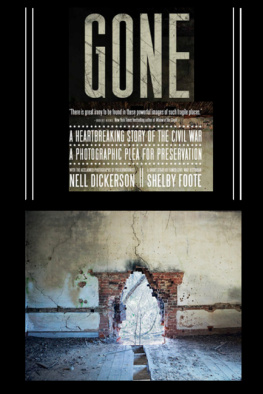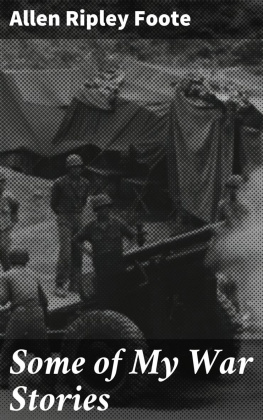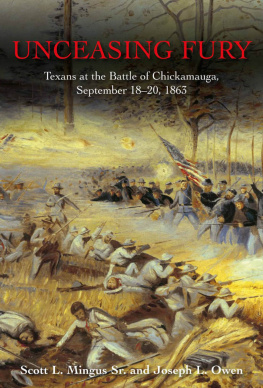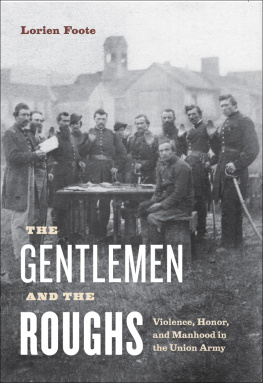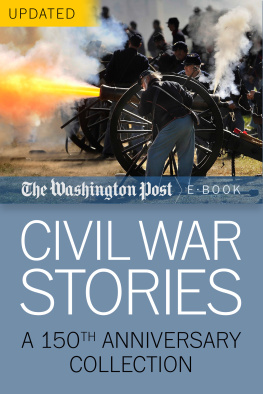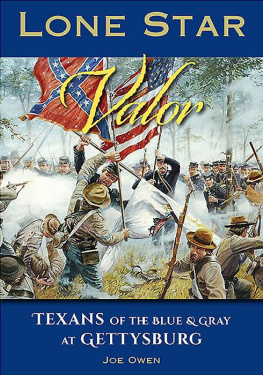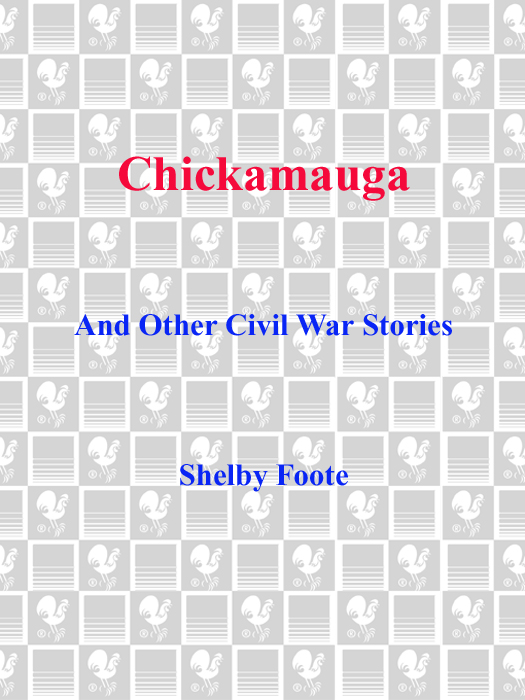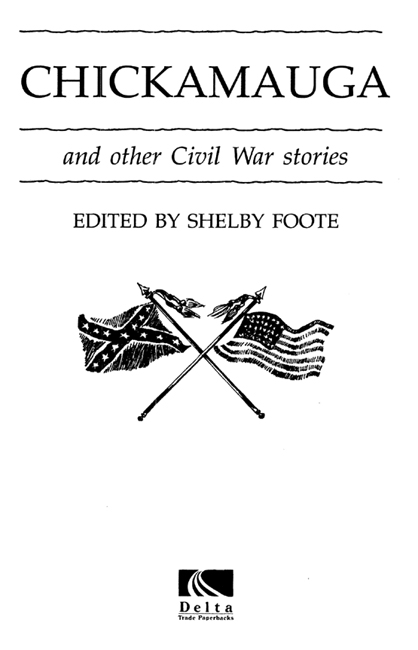Unforgettable writing
about the many faces of war

THE BURNINGbyEUDORA WELTY
Two Southern ladies react to the burning of their home by Yankees with a horrific courage and an act of fatal desperation.
CHICKAM ALIGAbyTHOMAS WOLFE
A ninety-five-year-old Confederate veteran remembers the strange battle of Stone Mountain, the tragedy of Shiloh, and the soul-changing experience of Chickamauga.
MY GRANDMOTHER MILLARD AND GENERAL BEDFORD FORREST AND THE BATTLE OF HARRYKIN CREEKbyWILLIAM FAULKNER
Part farce, part drama, this tale adds an unexpected twist to a wartime romance and an enterprising matriarch determined to save the familys valuables.
PILLAR OF FIREbySHELBY FOOTE
A disfigured Union officer carries out a campaign of retribution along the Mississippi and burns down an old mans home with chilling results.
SECOND INAUGURALbyABRAHAM LINCOLN
This succinct address, written with the same impassioned, pain-filled voice heard in the Gettysburg Address, reminds the nation of the rightness of the Unions cause.
A Delta Book
Published by
Dell Publishing
a division of
Bantam Doubleday Dell Publishing Group, Inc.
1540 Broadway
New York, New York 10036
The Night of Chancellorsville Reprinted with permission of Charles Scribners Sons an imprint of Macmillan Publishing Company, from TAPS AT REVEILLE by F. Scott Fitzgerald. Copyright 1935, and renewed 1963, by Francis Scott Fitzgerald Lanahan. Originally appeared in Esquire magazine.
Chickamauga Copyright 1937, Estate of Thomas Wolfe.
My Grandmother Millard and General Bedford Forrest and the Battle of Harrykin Creek From COLLECTED STORIES OF WILLIAM FAULKNER by William Faulkner. Copyright 1943 by William Faulkner. Reprinted by permission of Random House, Inc.
Fish-Hook Gettysburg from John Browns Body by Stephen Vincent Bent from THE SELECTED WORKS OF STEPHEN VINCENT BENT, Holt, Rinehart, and Winston. Copyright 1927, 1928 by Stephen Vincent Bent. Copyright renewed 1955, 1956 by Rosemary Carr Bent. Reprinted by permission of Brandt and Brandt, Literary Agents.
The Burning from THE BRIDE OF INNISFALLEN AND OTHER STORIES. Copyright 1951 and renewed 1979 by Eudora Welty. Reprinted by permission of Harcourt Brace and Company.
Pillar of Fire From JORDAN COUNTY by Shelby Foote. Copyright 1954. Reprinted by permission of RLR Associates, Ltd.
Excerpt from OURSELVES TO KNOW. From OURSELVES TO KNOW by John OHara. Copyright 1960 by John OHara. Reprinted by permission of Random House, Inc.
Copyright 1993 by Shelby Foote
All rights reserved. No part of this book may be reproduced or transmitted in any form or by any means, electronic or mechanical, including photocopying, recording, or by any information storage and retrieval system, without the written permission of the Publisher, except where permitted by law. For information address Addison-Wesley Publishing Company, Reading, Massachusetts.
The trademark Delta is registered in the U.S. Patent and Trademark Office.
Library of Congress Cataloging in Publication Data
Chickamauga and other Civil War stories / edited by Shelby Foote.
p. cm.
Contents: IntroductionProvisional inaugural / Jefferson DavisA young soldiers first battle / Stephen CraneThe night of Chancellorsville / F. Scott FitzgeraldChickamauga / Thomas WolfeAn occurrence at Owl Creek Bridge / Ambrose BierceMy Grandmother Millard and General Bedford Forrest and the Battle of Harrykin Creek / William FaulknerFish-Hook Gettysburg / Stephen Vincent BentThe burning / Eudora WeltyPillar of fire / Shelby FooteHomecoming / John OHaraA private history of a campaign that failed / Mark TwainSecond inaugural / Abraham Lincoln.
eISBN: 978-0-307-77923-6
1. United StatesHistoryCivil War, 1861-1865Fiction. 2. War stories, American. I. Foote, Shelby.
PS648.C54C45 1993
8130108358dc20
93-879
v3.1
CONTENTS
Provisional Inaugural
JEFFERSON DAVIS
A Young Soldiers First Battle
STEPHEN CRANE
The Night of Chancellorsville
F. SCOTT FITZGERALD
Chickamauga
THOMAS WOLFE
An Occurrence at Owl Creek Bridge
AMBROSE BIERCE
My Grandmother Millard and General Bedford Forrest and the Battle of Harrykin Creek
WILLIAM FAULKNER
Fish-Hook Gettysburg
STEPHEN VINCENT BENET
The Burning
EUDORA WELTY
Pillar of Fire
SHELBY FOOTE
Homecoming: An Excerpt from Ourselves to Know
JOHN OHARA
The Private History of a Campaign That Failed
MARK TWAIN
Second Inaugural
ABRAHAM LINCOLN
Introduction
In the summer of 1862, following McClellans mauled retreatfrom the gates of Richmond, James Russell Lowells reply to his editors request for a poem was that he was clear down to the bottom of the well, where I see the Truth too near to make verses of. Similarly, Harriet Beecher Stowesaluted by Lincoln in person as the little lady who started this big warresponded, when asked why she had not written a wartime sequel to Uncle Toms Cabin: Who could write fiction when life was so imperious and terrible? Nathaniel Hawthorne, on the other hand, felt mentally and physically languid under pressure from the conflict, and though he died while Grant was outmaneuvering Lee down in Virginia, just short of a year before the finish, he did manage to produce an essay titled Chiefly About War Matters in which he confessed that the Present, the Immediate, the Actual, has proved too potent for me. It takes away not only my scanty faculty, but even my desire for imaginative composition, and leaves me sadly content to scatter a thousand peaceful fantasies upon the hurricane that is sweeping us all along with it, possibly, into a Limbo where our nation and its polity may be as literally the fragments of a scattered dream as my unwritten Romance.
Nor did the end of the war provide any sudden correction of this blockage. Two years after Appomattox, William Dean Howellsassistant editor of the Atlantic Monthly at thirty, soon to be editor-in-chief, and for the next forty years the acknowledged dean of American lettersdeclared that the war has laid upon our literature a charge under which it has staggered very lamely. Cranes The Red Badge of Courage, published a generation later in 1895, was the exception that proved the rule; the sluice gate opened only to close again. Indeed, Howells complaint is nearly as valid today as it was when he made it, just over 125 years ago.
In this country, historical fiction has in general been left to second-raters and hired brains, and this is particularly true of those who have chosen the Civil War as a major subject. Aside from Crane, our best fiction writers have given it mere incidental attention or none at all. Hemingway is a case in point; so is Henry James. This is regrettable on several counts, especially to those who would understand our nation by learning just what happened during that blood-drenched eragood and bad things, both in abundanceto make us what we are. Facts we have had and are having in ever greater numbers, perhaps a glut, through the years leading up to and away from the Sumter centennial, when biographies, overall explications, and brochures came pouring in a torrent from the presses and binderies. Yet there is a multifaceted truth outside the factsbeyond them, so to speak, or hidden inside themand of this we have had all too little, because in this respect our novelists have let us down. I would rather have


